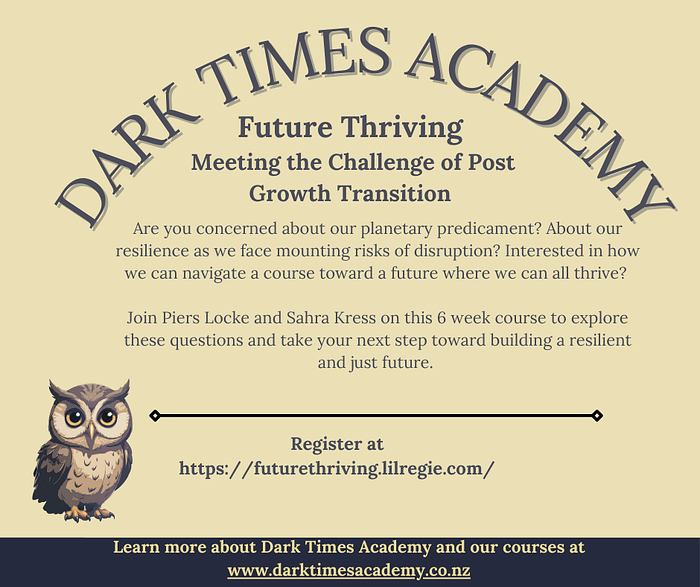Future Thriving-Meeting the challenge of Post Growth Transition
Tue 10 Sep – Tue 15 Oct 2024 NZDT
Check out the course webpage for more details!
Are you concerned about our planetary predicament? Are you concerned about our resilience as we face mounting risks of disruption? Are you interested in how we might navigate a course toward a viable future? If your answer is yes, then this course is for you. On this six week course you will engage with the planetary limits we are exceeding, the destabilizing risks they present, and the challenge of transitioning our social and economic systems. These are tense times and the feeling that our systems are no longer fit for purpose is growing. This leaves many of us wondering how best to cope and what we can do. This course will empower you to understand these problems better and to learn about the exciting initiatives that are emerging to address them.
Course Structure
This course will take the form of six weekly modules. In each module there will be a 20 minute video lecture, a 90 minute class on Zoom, a list of resources for reading, watching, or listening, a shared group chat on Signal, and e-mail access to the course instructor.
Zoom sessions for this class are:
- Tuesday 7:00 pm NZST
- Tuesday 5:00 PM AEST
Course Instructor
Piers Locke is an environmental anthropologist who has taught at universities in New Zealand and the UK, who has worked as a consultant on climate change and sustainability, and who is engaged in post-growth advocacy. Piers has his own consultancy called Solutions for Sustainable Futures and is a member of the organizing committee of Degrowth Aotearoa New Zealand (DANZ). Sahra Kress will also be contributing- she is a community midwife, and also the coordinator of the NGO Degrowth Aotearoa NZ (DANZ).
Course Modules
Week 1- Breaching the planet’s boundaries- investigating the biophysical limits we are exceeding, and how scientists have tried to calculate a safe operating space for humanity.
Week 2- Challenging economic growth- investigating the insistence on economic growth in modern society and the problematic use of GDP as a proxy for social progress.
Week 3- Understanding risk better- investigating the multiple, interacting risks human civilization is facing through the concepts of polycrisis and metacrisis.
Week 4- Green Growth vs Degrowth- investigating the key debate about whether we can achieve sustainability through technological and regulatory change without also reducing our use of energy and materials.
Week 5- Wellbeing within environmental limits- investigating the rise of wellbeing economics, Doughnut Economics, and Degrowth.
Week 6- The challenge of change- investigating the question of how to bring about change, and how we might transition toward a more just and resilient future.
Final project (voluntary)- Students will be encouraged to complete projects relevant to overshoot, risk, and transition with support from the course leader. This might take the form of; letters to newspapers, a short article for the DANZ blog, submissions to government, a pitch to local government, a report on, or address to, a local group, a survey of civic initiatives or activist endeavour, or an investigation of topics from the course. Projects may be submitted in written, recorded, or filmed form.
